2023年英语中考语法课件 情态动词(共17张PPT)
文档属性
| 名称 | 2023年英语中考语法课件 情态动词(共17张PPT) |  | |
| 格式 | zip | ||
| 文件大小 | 184.5KB | ||
| 资源类型 | 教案 | ||
| 版本资源 | 人教新目标(Go for it)版 | ||
| 科目 | 英语 | ||
| 更新时间 | 2023-04-12 10:49:18 | ||
图片预览

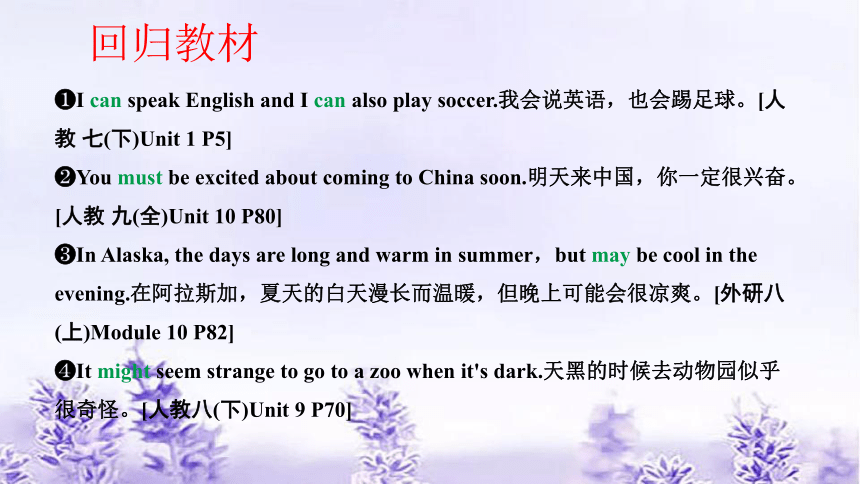
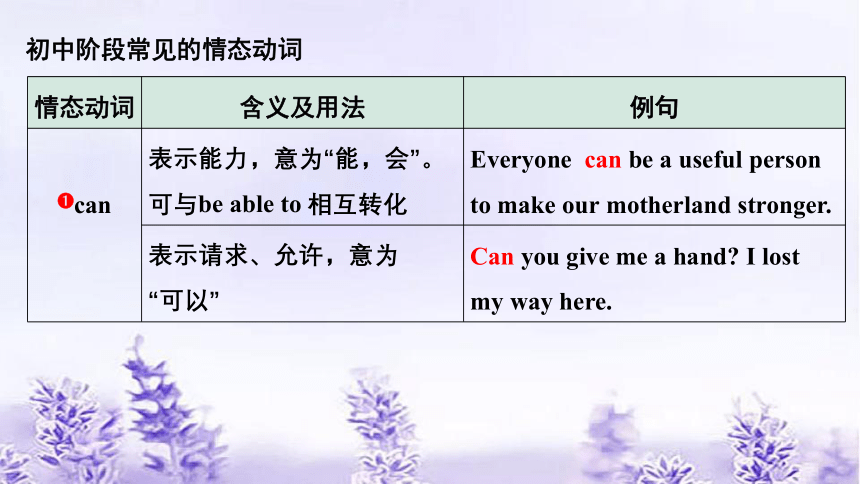
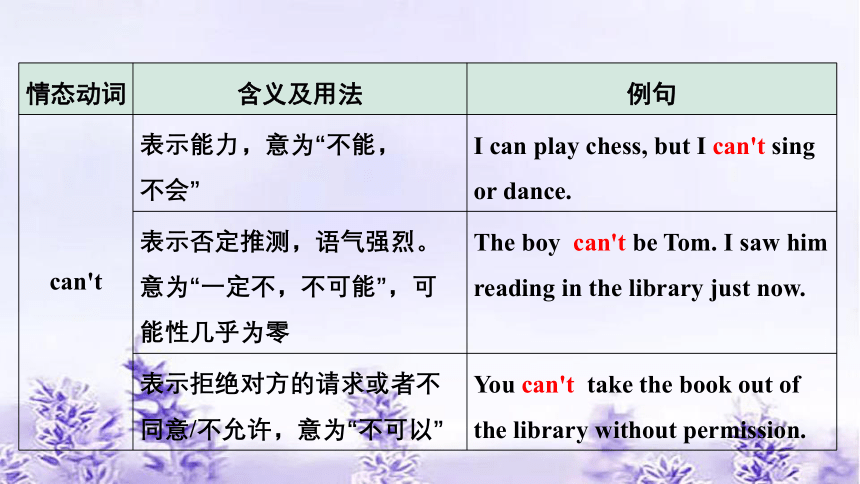
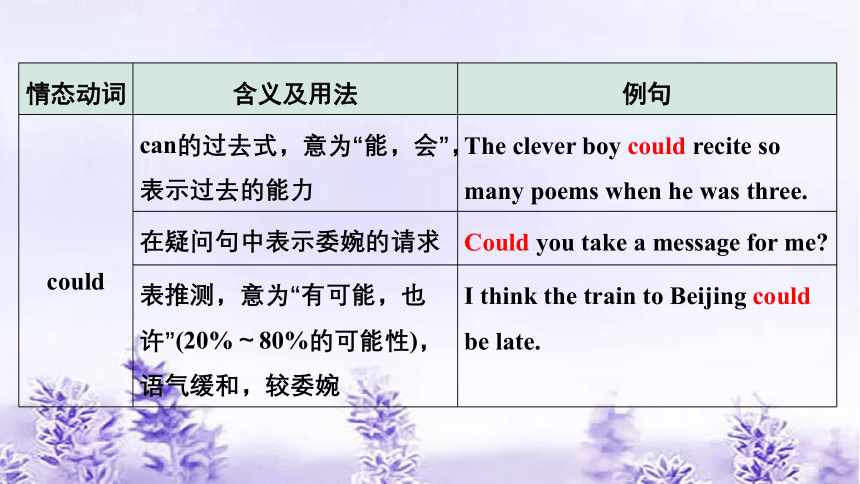
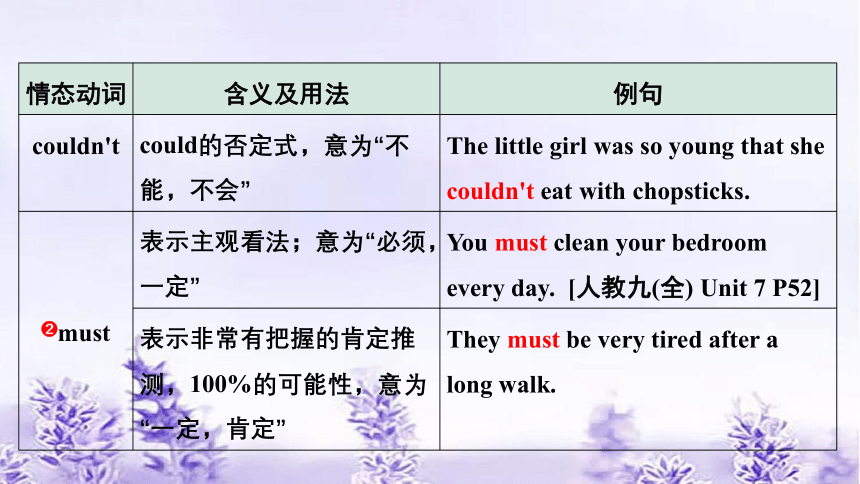

文档简介
(共17张PPT)
中考语法
情态动词
语法知识导图 语法精讲 习题巩固
I can speak English and I can also play soccer.我会说英语,也会踢足球。[人教 七(下)Unit 1 P5]
You must be excited about coming to China soon.明天来中国,你一定很兴奋。[人教 九(全)Unit 10 P80]
In Alaska, the days are long and warm in summer,but may be cool in the evening.在阿拉斯加,夏天的白天漫长而温暖,但晚上可能会很凉爽。[外研八(上)Module 10 P82]
It might seem strange to go to a zoo when it's dark.天黑的时候去动物园似乎很奇怪。[人教八(下)Unit 9 P70]
回归教材
初中阶段常见的情态动词
情态动词 含义及用法 例句
can 表示能力,意为“能,会”。可与be able to 相互转化 Everyone can be a useful person to make our motherland stronger.
表示请求、允许,意为 “可以” Can you give me a hand I lost my way here.
情态动词 含义及用法 例句
can't 表示能力,意为“不能, 不会” I can play chess, but I can't sing or dance.
表示否定推测,语气强烈。意为“一定不,不可能”,可能性几乎为零 The boy can't be Tom. I saw him reading in the library just now.
表示拒绝对方的请求或者不同意/不允许,意为“不可以” You can't take the book out of the library without permission.
情态动词 含义及用法 例句
could can的过去式,意为“能,会”,表示过去的能力 The clever boy could recite so many poems when he was three.
在疑问句中表示委婉的请求 Could you take a message for me
表推测,意为“有可能,也许”(20%~80%的可能性),语气缓和,较委婉 I think the train to Beijing could be late.
情态动词 含义及用法 例句
couldn't could的否定式,意为“不能,不会” The little girl was so young that she couldn't eat with chopsticks.
must 表示主观看法;意为“必须,一定” You must clean your bedroom every day. [人教九(全) Unit 7 P52]
表示非常有把握的肯定推测,100%的可能性,意为“一定,肯定” They must be very tired after a long walk.
情态动词 含义及用法 例句
mustn't must的否定式,意为“不许, 禁止” Students mustn't play with fire in the classroom.
may 表示请求、许可,意为“可以” May I play outside alone
表示可能,但不确定,通常用于陈述句的肯定式,暗含不确定 His answer may be right.
用于祈使句,表示祝福和祝愿,用法和wish相似 May you have a nice trip.
情态动词 含义及用法 例句
might may的过去式,常用于间接引语中 She worried that I might be angry.
表示请求、许可,语气比may更委婉 Might I ask you a question
表推测,意为“有可能,也许”,可能性低于may,语气缓和,较委婉 She might have gone to the library. She likes reading in the afternoon.
情态动词 含义及用法 例句
need 表示需要,主要用于否定句和疑问句中 Need I give you an example
needn't 意为“不需要,没必要” —Must I arrive at the airport ahead of time
—No, you needn't.
情态动词 含义及用法 例句
should/ ought to 意为“应该”,表示要求,命令,劝告或建议 You should give up smoking.
表示征询意见,常用于疑问句中 Should I take my temperature?[人教八(下)Unit 1 P2]
shouldn't 意为“不应该” We shouldn't depend so much on our parents.[鲁教九(全)Unit 9 P66]
I think we can read about these for fun, but we shouldn't believe in them.我认为我们可以以阅读这些为乐,但我们不应该相信它们。[译林牛津 九(上)Unit 1 P16]
What shall we do today?我们今天应该做什么?[冀教 八(下)Unit 8 P114]
You have to speak up because the students in the back cannot hear you.
你必须大声说话,因为后面的学生听不到你的声音。
[外研九(下)Module 3 P23]
情态动词 含义及用法 例句
shall 表示请求或征求对方意见,多用于第一、三人称,构成疑问句 Shall we get each of them a card and a gift to say thank you?
[人教九(全)Unit 14 P106]
will 表示询问、请求,用于疑问句中,常用于第二人称 Will you come with us
[冀教七(下) Unit 1 P15]
would 表示自愿做或主动提出做什么,如意志、愿望或决心等 He said he would be there at eight o'clock.
情态动词 含义及用法 例句
had better 意为“最好”。多用于第二人称,否定形式为had better not It is raining heavily. You had better stay at home.
have to 意为“不得不”,多表示客观必要 We also have to be quiet in the library.[鲁教六(下)Unit 6 P32]
【注意】
(1)由must引出的一般疑问句,肯定回答常用“Yes, 主语+must/have to.”; 否定回答常用“No, 主语+needn't/don't have to.”, 不能用mustn't回答。
(2)表示肯定推测的情态动词有:must>could>may>might(按语气强弱)。
(3)表示否定推测的情态动词有:can't>may not(按语气强弱)。
盲填,每空限填一词
1. Jerry didn't pay me back, but he promised that he ________ do this Sunday.
2. —Are you going to the cinema tonight
—I don't know. I ___________ go there or stay at home.
3. Lucy's cat was missing and she ________ find it anywhere. She must be very sad.
would
might/may
couldn't
习题巩固
4. Life changes a lot, so no one knows what ________ happen in the future. We should live a meaningful life and be happy all the time.
5. Volunteers sometimes ________ only do small things, but they really make a big difference to the world.
6. Everyone in the school ________________ follow the rules. Only in this way can we build a friendly environment for study.
will
may
must/should
Thank you
中考语法
情态动词
语法知识导图 语法精讲 习题巩固
I can speak English and I can also play soccer.我会说英语,也会踢足球。[人教 七(下)Unit 1 P5]
You must be excited about coming to China soon.明天来中国,你一定很兴奋。[人教 九(全)Unit 10 P80]
In Alaska, the days are long and warm in summer,but may be cool in the evening.在阿拉斯加,夏天的白天漫长而温暖,但晚上可能会很凉爽。[外研八(上)Module 10 P82]
It might seem strange to go to a zoo when it's dark.天黑的时候去动物园似乎很奇怪。[人教八(下)Unit 9 P70]
回归教材
初中阶段常见的情态动词
情态动词 含义及用法 例句
can 表示能力,意为“能,会”。可与be able to 相互转化 Everyone can be a useful person to make our motherland stronger.
表示请求、允许,意为 “可以” Can you give me a hand I lost my way here.
情态动词 含义及用法 例句
can't 表示能力,意为“不能, 不会” I can play chess, but I can't sing or dance.
表示否定推测,语气强烈。意为“一定不,不可能”,可能性几乎为零 The boy can't be Tom. I saw him reading in the library just now.
表示拒绝对方的请求或者不同意/不允许,意为“不可以” You can't take the book out of the library without permission.
情态动词 含义及用法 例句
could can的过去式,意为“能,会”,表示过去的能力 The clever boy could recite so many poems when he was three.
在疑问句中表示委婉的请求 Could you take a message for me
表推测,意为“有可能,也许”(20%~80%的可能性),语气缓和,较委婉 I think the train to Beijing could be late.
情态动词 含义及用法 例句
couldn't could的否定式,意为“不能,不会” The little girl was so young that she couldn't eat with chopsticks.
must 表示主观看法;意为“必须,一定” You must clean your bedroom every day. [人教九(全) Unit 7 P52]
表示非常有把握的肯定推测,100%的可能性,意为“一定,肯定” They must be very tired after a long walk.
情态动词 含义及用法 例句
mustn't must的否定式,意为“不许, 禁止” Students mustn't play with fire in the classroom.
may 表示请求、许可,意为“可以” May I play outside alone
表示可能,但不确定,通常用于陈述句的肯定式,暗含不确定 His answer may be right.
用于祈使句,表示祝福和祝愿,用法和wish相似 May you have a nice trip.
情态动词 含义及用法 例句
might may的过去式,常用于间接引语中 She worried that I might be angry.
表示请求、许可,语气比may更委婉 Might I ask you a question
表推测,意为“有可能,也许”,可能性低于may,语气缓和,较委婉 She might have gone to the library. She likes reading in the afternoon.
情态动词 含义及用法 例句
need 表示需要,主要用于否定句和疑问句中 Need I give you an example
needn't 意为“不需要,没必要” —Must I arrive at the airport ahead of time
—No, you needn't.
情态动词 含义及用法 例句
should/ ought to 意为“应该”,表示要求,命令,劝告或建议 You should give up smoking.
表示征询意见,常用于疑问句中 Should I take my temperature?[人教八(下)Unit 1 P2]
shouldn't 意为“不应该” We shouldn't depend so much on our parents.[鲁教九(全)Unit 9 P66]
I think we can read about these for fun, but we shouldn't believe in them.我认为我们可以以阅读这些为乐,但我们不应该相信它们。[译林牛津 九(上)Unit 1 P16]
What shall we do today?我们今天应该做什么?[冀教 八(下)Unit 8 P114]
You have to speak up because the students in the back cannot hear you.
你必须大声说话,因为后面的学生听不到你的声音。
[外研九(下)Module 3 P23]
情态动词 含义及用法 例句
shall 表示请求或征求对方意见,多用于第一、三人称,构成疑问句 Shall we get each of them a card and a gift to say thank you?
[人教九(全)Unit 14 P106]
will 表示询问、请求,用于疑问句中,常用于第二人称 Will you come with us
[冀教七(下) Unit 1 P15]
would 表示自愿做或主动提出做什么,如意志、愿望或决心等 He said he would be there at eight o'clock.
情态动词 含义及用法 例句
had better 意为“最好”。多用于第二人称,否定形式为had better not It is raining heavily. You had better stay at home.
have to 意为“不得不”,多表示客观必要 We also have to be quiet in the library.[鲁教六(下)Unit 6 P32]
【注意】
(1)由must引出的一般疑问句,肯定回答常用“Yes, 主语+must/have to.”; 否定回答常用“No, 主语+needn't/don't have to.”, 不能用mustn't回答。
(2)表示肯定推测的情态动词有:must>could>may>might(按语气强弱)。
(3)表示否定推测的情态动词有:can't>may not(按语气强弱)。
盲填,每空限填一词
1. Jerry didn't pay me back, but he promised that he ________ do this Sunday.
2. —Are you going to the cinema tonight
—I don't know. I ___________ go there or stay at home.
3. Lucy's cat was missing and she ________ find it anywhere. She must be very sad.
would
might/may
couldn't
习题巩固
4. Life changes a lot, so no one knows what ________ happen in the future. We should live a meaningful life and be happy all the time.
5. Volunteers sometimes ________ only do small things, but they really make a big difference to the world.
6. Everyone in the school ________________ follow the rules. Only in this way can we build a friendly environment for study.
will
may
must/should
Thank you
同课章节目录
- 词法
- 名词
- 动词和动词短语
- 动词语态
- 动词时态
- 助动词和情态动词
- 非谓语动词
- 冠词
- 代词
- 数词和量词
- 形容词副词及其比较等级
- 介词和介词短语
- 连词和感叹词
- 构词法
- 相似、相近词比较
- 句法
- 陈述句
- 一般疑问句和否定疑问句
- 特殊疑问句及选择疑问句
- 反意疑问句
- 存在句(There be句型)
- 宾语从句
- 定语从句
- 状语从句
- 主谓一致问题
- 简单句
- 并列句
- 复合句
- 主谓一致
- 主、表语从句
- 名词性从句
- 直接引语和间接引语
- 虚拟语气
- 感叹句
- 强调句
- 倒装句
- 祈使句
- 句子的成分
- 句子的分类
- 题型专区
- 单项选择部分
- 易错题
- 完形填空
- 阅读理解
- 词汇练习
- 听说训练
- 句型转换
- 补全对话
- 短文改错
- 翻译
- 书面表达
- 任务型阅读
- 语法填空
- 其他资料
